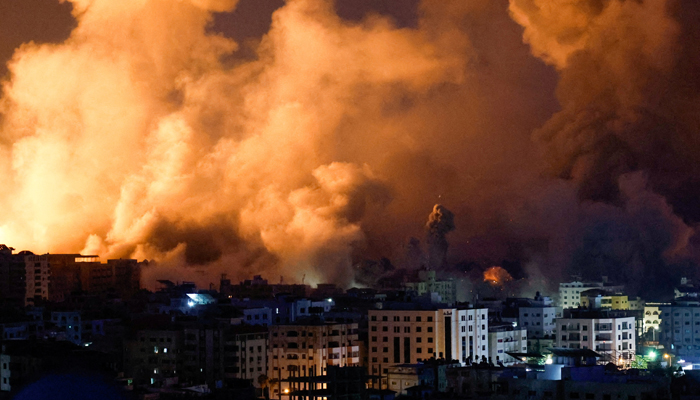Is Israel-Hamas war a threat to IMEEC?
Beijing views IMEEC as a way to further unilateralism, protectionism and hegemonism by US
October 16, 2023

The war between Israel and the Hamas group dragging two other Arab nations (Syria and Lebanon) has put a huge question mark on the validity of the India-Middle East-Europe Economic Corridor (IMEEC).
After all, Israel has to play a key role in connecting India to Europe.
This sea-land-sea transport corridor is supposed to go all the way from India, UAE, Saudi Arabia and Jordan to Israel. Then, from the Haifa port of Israel, it becomes a multi-dimensional sea corridor to connect Bulgaria, Greece, Croatia, Italy, France and Spain. This ambitious project equally has the potential to connect a number of other adjacent countries in future.
It was probably through this project that a number of Middle Eastern countries had fast officially recognised Israel. No doubt, they had been negotiating with Israel for long, but this haste had surprised many.
Some in Tel Aviv had expected that Riyadh would also stay the course but the current conflict has changed the dynamics. At least for now, Saudi Arabia has paused the normalisation process.
As a matter of fact, no one knows what the total death toll of Arabs would be at the end of the war and what would be the repercussions of that genocide.
Over the years, it has been noted that Israel kills, at least, 10 Palestinians to avenge the death of one citizen.
This time, not only the Israeli death toll is unprecedented but also the humility it has faced is historic. As a matter of fact, the Hamas-led Operation Al-Aqsa Flood has exposed that the 'King is naked'.
Moreover, the current conflict has revealed the vulnerability of Haifa as an international port city. Geographically, this port city is located almost 130 kilometres north of Gaza — the base camp of Hamas. It is almost at the same distance (140km) from another Arab country — Syria — that has been dragged into the conflict.
A few days ago, Ezzedine al-Qassam Brigades, the armed wing of the Palestinian resistance organisation, Hamas, had shelled this jugular vein of IMEEC with R-160 rockets.
Yet, the most threatening is the fact that this prized land also falls under the range of rockets fired by the much more powerful Lebanese resistance organisation Hezbollah.
During the 2006 Israel-Lebanon war, Hezbollah had bombed this Industrial city repeatedly. It has joined the current war as well by shelling missiles at Israeli army posts and cities.
Lebanese religious and political leader Hassan Nasrallah who also serves as the secretary-general of Hezbollah has recently warned Israel that, "We know more about the port of Haifa than the port of Beirut."
Hence, Haifa faces an existential threat from all three sides — Palestine, Lebanon and Syria.
This scenario will be a big blow to the United States which has taken almost two decades to come up with an alternative to the Chinese Belt and Road Initiative.
For Beijing, this situation is a blessing in disguise as bombing Haifa can break the crucial link of IMEEC.
A lot can be read from the recent statement of Chinese Foreign Minister Wang Yi who warned Israel that strikes on the Gaza Strip have gone "beyond the scope of self-defence".
Wang Yi's statement comes at a time when, from October 17 to 18, China is holding its third Belt and Road Forum 'for international cooperation' in Beijing. This BRI is a multi-trillion-dollar flagship project initiated by Chinese President Xi Jinping in 2013.
President Xi is expected to deliver a keynote address under the theme 'High-quality Belt and Road Cooperation: Together for Common Development and Prosperity'.
China has invited 130 nations including Pakistan and 30 international organisations. The representatives will deliberate on connectivity in multiple fields, green development and digital economy. Additionally, they will try to find ways to "injecting" positive energy into world peace and development.
Some of the invitees have recently joined IMEEC as well. Hence, it is expected that the Chinese government will emphasise that only BRI is the way forward in the 21st century and can serve as the basis for world trade.
Beijing views IMEEC as a way to further unilateralism, protectionism and hegemonism by Washington. It is trying to convince BRI members that only the revival of these ancient routes will bridge the wealth gap between rich and poor countries.
For China, BRI is also a revival of past glories as it ‘carries forward the spirit of the ancient silk routes’. It equally reminds Beijing of Zhang Qian, the 140 BC Han Dynastic royal emissary who had undertaken a journey from the present-day Xi’an in Shaanxi Province to the West.
The reincarnation of this project on a much bigger scale is expanding Chinese influence in Asia, Europe and Africa.
However, the economic meltdown caused by the Ukraine war has hampered the growth of many BRI members. Some are even unable to utilise the full benefits of the completed projects. The current Israel-Arab war may further shatter their financial strength.
Hence, an attack on Israel may be a big blow to IMEEC but at the same time, it will further put pressure on struggling economies of BRI members.
On the other hand, it is incumbent upon Washington to come to the rescue of Tel Aviv. For the US, defending Israel not only protects IMEEC but also serves strategic interests in the Middle East and beyond.
In a nutshell, the US may afford to lose Ukraine's war with Russia but not Israel at any cost.
The author is Controller News at Geo News
Disclaimer: The viewpoints expressed in this piece are the writer's own and don't necessarily reflect Geo.tv's editorial policy.











